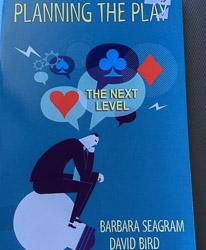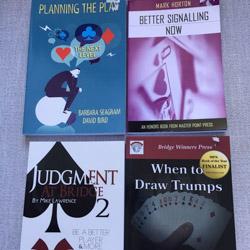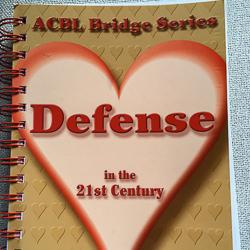Latest News

This book extends the concept to more complex situations, and covers ideas such as safety plays, avoidance plays, trump control, dummy reversal, and end plays.
Planning the Play is a book aimed to the Intermediate Player wanting to "get to the next level" - it should help players who have a good grasp of the basics of declarer play and are looking to improve from there.

Thanks to Marieta Borthwick and Heidi Colenbrander we have 4 new books at the library.
Marieta and Heidi won a book voucher in a recent competition and donated it to the club.

This book contains nine chapters covering:
- Opening Leads against NT
- Opening Leads against Suits
- Third Hand Play
- Second Hand Play
- Defensive Signals
- Developing Defensive Tricks
- Interfering with Declarer
- Making a Plan
- Negative Doubles - (our topic this month - sample deals and exercises )
Each chapter includes a summary which is a great help to the reader.

This month we have 2 copies of Conventions to Improve Your Strong Hand Bidding – Workbook by Joan Butts on the subject of the month covered by our Bridge Education Team – Strong Hand Bidding.
- Lesson 1 - Strong Unbalanced Hands
- Lesson 2 - Slam Bidding and Blackwood
- Lesson 3 - Cue Bidding to Slam
- Lesson 4 - Puppet Stayman
- Lesson 5 - Strong Balanced Hands
This workbook describes the bids and responses; has 4 boards of examples and a Quiz with answers. This enables the reader to work through the information practise the bidding and check their responses.

The endplay has fascinated bridge players for decades.
The idea that, even in the face of bad luck, there is a way to make a contract is captivating.
Audrey Grant's Five Steps to Simplify the Endplay makes it accessible to players with a wide range of experience and skill. Audrey’s book shows 5 simple steps and allows you to practise using the set deals:

Acclaimed US teacher, Larry Cohen, has as part of his website some short articles explaining the bridge scoring fundamentals that are critical to bidding tactics.
If you learned the game in the current world of computerised bridge scoring you probably need this guidance to understand why it is often good to interfere in the bidding - and sometimes not!
The impact on your bridge results of reading these three short articles might be far larger that you think.

A new edition of The Language of Bidding is now available at our library. It describes what you need to know about bidding to become a strong bridge player.
This edition is based on Two over One. This is an extension of Standard, where a non-jump response in a new suit at the two level is forcing to game.
According to the author, Paul Marston, this brings two benefits - it's easier to use and it's more effective.

KK wrote: Hello! While playing bridge the other day with my regular group, my partner bid two clubs, the next player bid two hearts, then I passed because I didn’t have any points (as did the next player).
A debate ensued as to whether or not I was allowed to pass vs. bidding.
What is your take on the situation?